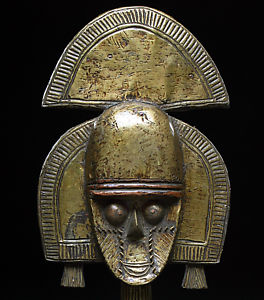| Location: |
Southeastern Cote d'Ivoire | | Population: |
100,000 |
| Language: |
Anyi (Akan cluster o |
| Neighbors: |
Asante, Brong, Baule, Guro, Yaure |
| Types of Art: |
The most important art forms among the Anyi are funerary images and monuments. A family can demonstrate its affluence through grave monuments to the ancestors. Among the Anyi, artistic expression is focused on creating these types of memorials, for it is believed that the more beautiful the monument is, the greater is the respect for the deceased. |
| History: |
The rise of the early Akan centralized states began in the 13th century and may be related to the opening of trade routes established to move gold throughout the region. The Anyi people are a subgroup of the Akan who migrated to their current location from what is present day Ghana between the 16th and 18th centuries. They were never as powerful as the Asante and Baule and as a result were indirectly under their rule during the height of both empires. |
| Economy: |
Anyi agricultural economy revolves around banana and taro production. Yams are also an important staple crop in the region. Many locally grown crops were introduced from the Americas during the Atlantic slave trade. These include maize, manioc, peppers, peanuts, tomatoes, squash, and sweet potatoes. They also raise farm animals including sheep, goats, chickens, and dogs. Markets which are primarily run by women take place every four days and are the center of the local economy. Local produce and craft items are sold alongside imported goods from all over the world. Palm oil is also sold as a commodity on the international market. |
| Political Systems: |
The Anyi live in loose neighborhoods of family housing complexes which are generally spread apart. There is usually a local headman, who is directed by a council of elders and who represents his constituency in regional politics. Like other Akan peoples, the Anyi have a highly stratified society that includes a hierarchical political administration with titled officials who proudly display their rank and power. The Anyi are a matrilineal people, and women have relatively high social status exhibited in both the political and economic arenas. |
| Religion: |
Living one's life so that one will be remembered and respected as an ancestor is one of the primary motivations for the Anyi. Their religious system is based upon the continued honoring of one's departed ancestors. When a person passes away an elaborate ceremony follows, involving ritual washing, dressing the deceased in fine garments and gold jewelry to be laid in state for up to three days, and a mourning period that allows the family and community to show their respect for the departed in order to guarantee a welcome into the spirit world. |
| Credit: |
McIntyre, L. Lee and Christopher D. Roy. 'Art and Life in Africa Online.' 1998: The Art and Life in Africa Project, http://www.uiowa.edu/%7Eafricart/toc/people.html |
|

